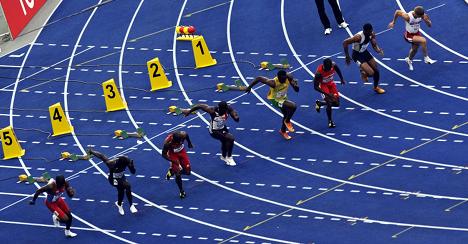The first golds of the August 15-23 meeting went to Valeriy Borchin in the men’s 20km walk and Kenya’s Linet Chepkwemoi Masai, who broke a 12-year Ethiopian stranglehold on the women’s 10,000m.
The US team also got its bandwagon rolling when Christian Cantwell won the men’s shot put title ahead of Poland’s Olympic champion Tomasz Majewski, with home favourite Ralf Bartels taking bronze.
In sultry conditions at the Olympic Stadium, it was Bolt’s team-mate and former world record holder Asafa Powell, however, who set the pace in the 100m.
The bronze medallist from the 2007 Osaka worlds looked very comfortable when racing home to win his quarter-final in 9.95sec and refused to ease up as he had done in the opening heats when he was beaten into third.
“I’m fine. I just wanted to get through the day,” Powell said. “The first round in the morning I was just running too easy and I underestimated the other guys.”
Bolt was beaten into second in his heat by training partner Daniel Bailey of Antigua, with the two sprinters easing up and even laughing together as they crossed the line in just over 10sec.
“I’m tired. It’s been an exhausting day,” said Bolt.
In the US camp, defending triple world sprint champion Gay cruised through in the second fastest time of 9.98sec along with his trio of team-mates Darvis Patton, Michael Rodgers and Monzavous Edwards.
But the visibly limping Gay again complained of his nagging injury.
“My groin is sore but, all in all, it went pretty well,” he said.
In what is building up to be a USA v Jamaica sprint-off, Jamaican Michael Frater also qualified for Sunday’s semi-finals, slated for 0955 GMT, with the final scheduled for 1935 GMT.
Briton Dwain Chambers, the world indoor 60m silver medallist who is competing here after having served a two-year doping ban, won his heat in a personal season’s best of 10.05sec ahead of Richard Thompson of Trinidad.
Russian Olympic champion Borchin claimed the first gold of the championships when he won the men’s 20 kilometres walk title ahead of China’s Wang Hao and Mexican Eder Sanchez.
In the women’s 10,000m, Masai produced a stunning back-from-the-dead burst to snatch victory from Ethiopia’s Meselech Melkamu, with Wude Ayalew in third and fellow Ethiopian Meseret Defar in fifth.
“I can’t believe it,” beamed Masai, who took advantage of the absence through injury of defending champion Tirunesh Dibaba of Ethiopia.
“I didn’t give up. The Kenyan team’s plan was to help each other towards the end.”
Melkamu admitted that she had not even seen Masai on her outside at the line.
“I’m very, very disappointed that we lost the gold,” she said.
After the first day of the heptathlon, Britain’s Jessica Ennis remained in pole position on 4,124 points having recorded field leads of 12.93sec in the 100m hurdles, 1.92m in the high jump and 23.25sec in the 200m, and a personal best of 14.14m in the shot put.
Bar the lead putt in the shot, Ukraine’s Olympic champion Nataliya Dobrynska suffered a poor day but still remained in second place on 3,817 points.
The second day of competition on Sunday involves long jump, javelin and the 800m.



 Please whitelist us to continue reading.
Please whitelist us to continue reading.
Member comments